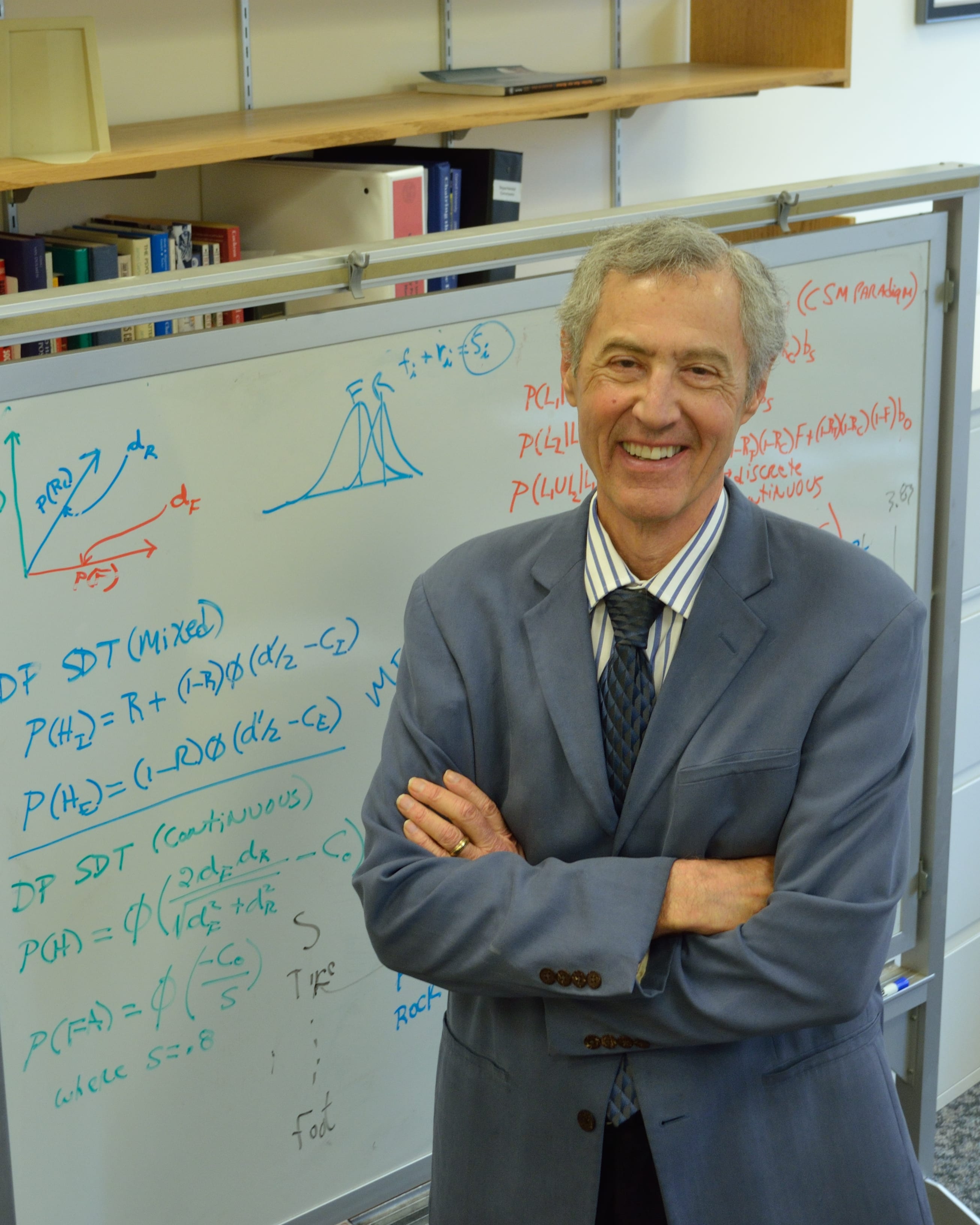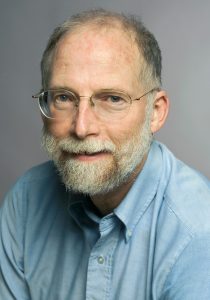 Loading...
Loading...


Charles Brainerd, professor of human development and human neuroscience, will receive the American Psychological Association’s G. Stanley Hall award for distinguished contributions to developmental science at the APA’s August 2019 meeting in San Francisco.
Regarded as the highest honor in the field of developmental psychology, the award is given to an individual or research team who has made distinguished contributions to developmental psychology in research, student training and other scholarly endeavors.
Brainerd’s research has had an impact on educational, developmental and cognitive psychology, and he is credited with major breakthroughs across his theoretical and empirical work.
“Chuck has done groundbreaking work in human memory and reasoning through experimental behavioral methods, mathematical models and neuroscience techniques,” said Qi Wang, professor of human development and department chair. “He co-developed fuzzy-trace theory of memory, judgment and decision-making that has been widely applied in the law and in medicine. His work exemplifies the best integration of theory-driven experimentation and evidence-based translational research.”
According to the APA, the award is based on the scientific merit of the individual’s work, the importance of this work for opening up new empirical or theoretical areas of developmental psychology, and the importance of the individual’s work linking developmental psychology with issues confronting society or with other disciplines.
Brainerd’s current research centers on the relationship between memory and higher reasoning abilities in children and adults, also focusing on false-memory phenomena, cognitive neuroscience, aging and neurocognitive impairment.
He has published more than 300 research articles and chapters and more than 20 books. His research covers human memory and decision-making, statistics and mathematical modeling, cognitive neuroscience, learning, intelligence, cognitive development, learning disability and child abuse.
Brainerd has been elected to the National Academy of Education; is a fellow of the Division of General Psychology, the Division of Experimental Psychology, the Division of Developmental Psychology and the Division of Educational Psychology of the American Psychological Association; and is a fellow of the American Psychological Society.
The editor of the journal Developmental Review, Brainerd has served as associate editor for journals including Child Development and The Behavioral and Brain Sciences.
Brainerd’s win of the 2019 G. Stanley Hall Award immediately follows the 2018 win of Stephen Ceci, the Helen L. Carr Professor of Developmental Psychology in the Department of Human Development.
Stephen D’Angelo is assistant director of communications at the College of Human Ecology.
 Loading...
Loading...
This interview with Dr. Gary Evans, Elizabeth Lee Vincent Professor in the College of Human Ecology, was written for the Jacobs Foundation's BOLD initiative.
Reprinted from the Blog on Learning & Development, May 15, 2017.
Meeri Kim: Much of your work focuses on how children’s environment affects their health and well-being — in particular, the ways in which childhood poverty can lead to negative developmental outcomes. What are the components of poverty that tend to hit kids the hardest?

Gary Evans: Throughout my work, I’ve tried to make the point that one of the reasons why poverty is harmful for kids is the chronic stress they experience as a result. One of the things that is unique and unfortunately quite powerful about childhood poverty is this accumulation of stressors, both physical and psychosocial. Physical stressors include housing issues, noise, crowding, and pollution. But the kids also experience psychosocial stressors like crime, family turmoil, and residential instability.
“Parts of the brain may change in children who grow up in poverty, leading to less efficient control and regulation of some cognitive and emotional processes than their wealthier peers.”
MK: How does constant exposure to such stressors impact the developing brain?
GE: The physiological response systems that are designed to handle relatively infrequent environmental stressors become overwhelmed for disadvantaged children. There is good evidence that parts of the brain linked to executive control — involved in coordinating things and keeping everything organized — are sensitive to chronic stress. Structurally as well as functionally, these regions may change in children who grow up in poverty, leading to less efficient control and regulation of some cognitive and emotional processes than their wealthier peers.
At the same time, other parts of the brain tied to automated, quick responses to stress and emergencies like the amygdala become over-developed and over-activated. So you have this bad mix of heightened emotional responses coupled with less regulation and control.
MK: Recently, you published a study on the link between childhood poverty and adult psychological well-being. What did you find?
GE: I looked at the psychological well-being of 24-year-olds in relation to their family income when they were 9 years old, finding relationships with a number of mental health and cognitive outcomes. Childhood poverty is linked to deficits in adult memory, greater psychological/physiological distress, and higher levels of aggression.
Another research interest is how motivation and helplessness differ for those who grew up in an impoverished environment. We have given both children and adults age-appropriate tasks to persist on, and we see consistently less persistence from the disadvantaged. When challenged, they’re much more likely to give up. To me, that unfortunately fits our model — if you grow up with a lot of stressors, your environment sets you up for feeling like you don’t have a sense of mastery or self-efficacy. This is a dynamic, particularly for children, that we need to look more at.
“If you grow up with a lot of stressors, your environment sets you up for feeling like you don’t have a sense of mastery or self-efficacy.”
MK: Given your findings on poverty, what kinds of policy changes could help enhance these children’s lives? Universal basic income?
GE: Various experiments have shown that when you increase the income of families in poverty, you may get better health outcomes, better parenting, and reductions in various negative outcomes. I believe any policy approach has to increase income in a way that is predictable and reliable, coupled with more available and affordable services for these families.
“Because poverty includes a convergence of multiple risk factors and stressors, it really means multiple interventions are necessary.”
Because poverty includes a convergence of multiple risk factors and stressors, it really means multiple interventions are necessary. You can’t just provide housing or job training. You really have to look across the board. A classic example is taking people off of welfare and giving them a low-income job, which is usually right around the minimum wage. However, if there is little or no childcare, the program winds up not being nearly as effective as it ought to be. Good-quality free or heavily subsidized childcare coupled with employment or job training may work better.
 Hear Associate Professor of Psychology and Human Development at Cornell University Katherine Kinzler discuss her work in child food preferences (with collaborators Zoe Liberman, University of California, Santa Barbara; and at the University of Chicago, Samantha Fan, Amanda Woodward, Boaz Keysar); and how working with scholars on the project across the fields of psychology, philosophy, and theology has impacted her approach to thinking about her research. (Reprinted from the Virtue Blog for the Virtue, Happiness, & the Meaning of Life project at University of Chicago.)
Hear Associate Professor of Psychology and Human Development at Cornell University Katherine Kinzler discuss her work in child food preferences (with collaborators Zoe Liberman, University of California, Santa Barbara; and at the University of Chicago, Samantha Fan, Amanda Woodward, Boaz Keysar); and how working with scholars on the project across the fields of psychology, philosophy, and theology has impacted her approach to thinking about her research. (Reprinted from the Virtue Blog for the Virtue, Happiness, & the Meaning of Life project at University of Chicago.)
Reprinted from the Cornell Chronicle, December 21, 2016
By Susan Kelley
A large and growing body of research shows that poor kids grow up to have a host of physical problems as adults.
Now add psychological deficits to the list, Cornell researchers say.
Childhood poverty can cause significant psychological deficits in adulthood, according to a sweeping new study. The research, conducted by tracking participants over a 15-year period, is the first to show this damage occurs over time and in a broad range of ways.
Impoverished children in the study had more psychological distress as adults, including more antisocial conduct like aggression and bullying and more helplessness behavior, than kids from middle-income backgrounds. Poor kids also had more chronic physiological stress and more deficits in short-term spatial memory.

“What this means is, if you’re born poor, you’re on a trajectory to have more of these kinds of psychological problems,” said Gary Evans, the author of the study and the Elizabeth Lee Vincent Professor of Human Ecology, and professor in the departments of design and environmental analysis, and human development.
Why? In a word, stress.
“With poverty, you’re exposed to lots of stress. Everybody has stress, but low-income families, low-income children, have a lot more of it,” Evans said. “And the parents are also under a lot of stress. So for kids, there is a cumulative risk exposure.”
Evans, a child psychologist who specializes in the effects of stress on children, is the author of “Childhood poverty and adult psychological well-being,” published Dec. 12 in the Proceedings of the National Academic of Sciences (PNAS).
The findings are important because kids who grow up in poverty are likely to stay impoverished as adults, Evans said. For example, there’s a 40 percent chance that a son’s income will be the same as his father’s income. That’s because the United States has the least social mobility of any wealthy Western democracy, he said.
“People walk around with this idea in their head that if you work hard, play by the rules, you can get ahead,” Evans said. “And that’s just a myth. It’s just not true.”
In his study, Evans tested 341 participants, all white, at ages 9, 13, 17 and 24.
Short-term spatial memory was tested by asking adult study participants to repeat increasingly complex sequences of lights and sounds by pressing four colored pads in the correct order – similar to the “Simon” game. The adults who grew up in poverty had a diminished ability to recall the sequences, compared to those who did not.
“This is an important result because the ability to retain information in short-term memory is fundamental to a host of basic cognitive skills, including language and achievement,” Evans wrote.
Although the participants were assessed on this measure only when they were adults, this test had the strongest association with childhood poverty of the four measures.
Helplessnesswas assessed by asking the participants to solve an impossible puzzle. Adults who grew up in poverty gave up 8 percent quicker than those who weren’t poor as kids. Previous research has shown chronic exposure to uncontrollable stressors – such as family turmoil and substandard housing – tends to induce helplessness.
Mental healthwas measured with a well-validated, standardized index of mental health with statements including “I argue a lot” and “I am too impatient.” Adults who grew up in poverty were more likely to agree with those questions than adults from a middle-income background.
Chronic physiological stress was tested by measuring the participants’ blood pressure, stress hormones and body mass index. Adults who grew up in poverty had a higher level of chronic physical stress throughout childhood and into adulthood.
The study has two implications, Evans said. First, early intervention to prevent these problems is more efficient and more likely to work.
“If you don’t intervene early, it’s going to be really difficult and is going to cost a lot to intervene later,” he said.
Second, increasing poor families’ incomes is the most efficient way to reduce a child’s exposure to poverty and, in turn, their risk of developing psychological problems. Evans supports the creation of a safety net, similar to Social Security’s supplemental income for the elderly and disabled. If a family is poor and has children, the federal government should provide them with supplementary income sufficient to participate in society, he said.
“It’s not true you can’t do anything about poverty. It’s just whether there’s the political will, and are people willing to reframe the problem, instead of blaming the person who is poor and – even more preposterous – blaming their children,” he said.
“This is a societal issue, and if we decide to reallocate resources like we did with the elderly and Social Security, we could change the kind of data this study is showing,” he said.
“Could we get rid of poverty? Probably not,” Evans said. “But I think we could change it dramatically.”
The research was supported by the W.T. Grant Foundation, the John D. and Catherine T. MacArthur Foundation and the National Institute for Minority Health and Health Disparities.
Reprinted from the College of Human Ecology, NewsHub
By Tyler Alicea ’16, MPS ’17

In faculty research labs, in communities across the state, and at jobs and internships around the globe, Human Ecology undergrads are making a powerful impact this summer as they apply their knowledge and skills in real-world settings.
Brian LaGrant ’17, a human development major from New Hartford, N.Y., discusses his research on factors surrounding imitation among children and adults:
What are you working on this summer?
I’m working on social learning in children and adults. I’m in the Affect and Cognition Lab. We work primarily on neuroscience research, but we’re also doing another project on social learning.
We have this apparatus like a puzzle box, and it’s supposed to simulate something that you haven’t seen before. People can watch somebody else see how to open it and then they can have their turn trying to open it. So that’s what we’re using to measure imitation.
When you copy somebody, they can have different characteristics, like they might be smart or they’re not sure how to open the box. They might be a very prestigious individual or a very well-respected individual or not so much. We want to see how those two factors—knowledge and prestige—can affect how much that model is imitated by children and adults.
How does this work relate to your coursework?
I’ve done a lot of neuroscience research, and this is a little different from what I’m used to, but I really like it because it ties into human culture and how we have evolved over many generations. Social learning is a very important aspect of development, especially a concept called the “ratchet effect,” which is how we innovate new technology over time. I haven’t really focused on social learning throughout my undergraduate years, but it’s a nice complement to the other kind of education I’ve been focusing on.
Who are your Human Ecology mentors?
I’ve formed a few close relationships within the College of Human Ecology as a whole, and specifically human development. Professor Marianella Casasola has been there with me since day one. When I lived in Donlon Hall, she was a faculty-in-residence and from there we formed a close relationship, and I was able to do some research with her, and she’s taught some of my classes over time. Professor Eve De Rosa, one of the principal investigators in my lab, has been a great help, and she’s so nice and so welcoming to any ideas that I have. They’ve both been very important to my development at Cornell.
What excites you about your research?
What excites me the most is that this is my first time having more of an independent role in the research where I can design the experiments and start running them on my own. Having that authority and independence is really, really exciting, and it makes me want to perform research in the future.
What societal impacts does your work have?
One thing I’ve been looking at recently is how autistic children might act differently at these tasks, and that’s something I could study in the future. For the area of research I’m focusing on, social learning, this kind of research hasn’t been done before. I think it’s important because looking at two or three different conflicting factors like I am is a better simulation of what the real world is like. Previous research has only looked at one factor, but there are so many different factors at play—whether a person is knowledgeable, prestigious, and things like that. I think my research is delving more into that area.
Brian’s summer project, The Influences of Model Social Status and Knowledge State on Imitation in Children and Adults, is funded by a College of Human Ecology summer research stipend, which provides undergraduate students will funding for full-time research with a faculty member.
By Tyler Alicea ’16, MPS ’17; photo by Mark Vorreuter.
 New book probes emotion, aging and health New approaches to understanding physical and psychological changes in old age – differences in personality, for instance, or responses to stressful events and the role of positive emotions in promoting well-being – are presented in a new book co-edited by Cornell human development professors Anthony Ong and Corinna Loeckenhoff. New book probes emotion, aging and health New approaches to understanding physical and psychological changes in old age – differences in personality, for instance, or responses to stressful events and the role of positive emotions in promoting well-being – are presented in a new book co-edited by Cornell human development professors Anthony Ong and Corinna Loeckenhoff. |
 Retweeting may overload your brain In a digital world where information is at your fingertips, be prepared to hold on tight before it slips right through them. Research at Cornell and Beijing University finds retweeting or otherwise sharing information creates a “cognitive overload” that interferes with learning and retaining what you’ve just seen. Retweeting may overload your brain In a digital world where information is at your fingertips, be prepared to hold on tight before it slips right through them. Research at Cornell and Beijing University finds retweeting or otherwise sharing information creates a “cognitive overload” that interferes with learning and retaining what you’ve just seen. |
 Inside Cornell’s BABY Labs Steven S. Robertson and Marianella Casasola, professors in Human Development, run baby labs at Cornell. where researchers are discovering more about the nuances of infant development. It’s a crucial area of academic research and exploration, given the impact early development has on later stages of life. Inside Cornell’s BABY Labs Steven S. Robertson and Marianella Casasola, professors in Human Development, run baby labs at Cornell. where researchers are discovering more about the nuances of infant development. It’s a crucial area of academic research and exploration, given the impact early development has on later stages of life. |
 Mapping the Resting-state Brain In the Department of Human Development, fMRI (functional magnetic resonance imaging) informs Nathan Spreng’s studies of large-scale brain network dynamics and their role in cognition. Mapping the Resting-state Brain In the Department of Human Development, fMRI (functional magnetic resonance imaging) informs Nathan Spreng’s studies of large-scale brain network dynamics and their role in cognition. |
 Checking Up on the Science of Homosexuality A new systematic review and commentary published in the journal Psychological Science in the Public Interest takes a sweeping look at what the evidence says about homosexuality and sexual orientation in general. Checking Up on the Science of Homosexuality A new systematic review and commentary published in the journal Psychological Science in the Public Interest takes a sweeping look at what the evidence says about homosexuality and sexual orientation in general. |
 Side by side Many undergraduates in Human Development work side by side with faculty in the lab. Read about this transformative approach to learning in an interview with Annie Erickson '16 and her mentor, Professor Eve De Rosa. Side by side Many undergraduates in Human Development work side by side with faculty in the lab. Read about this transformative approach to learning in an interview with Annie Erickson '16 and her mentor, Professor Eve De Rosa. |
 Studies Suggest Multilingual Exposure Boosts Children's Communication Skills Listen to NPR's Robert Siegel's interview with Katherine Kinzler, associate professor of psychology and human development, about her research on the development of social skills in monolingual and multilingual children. Studies Suggest Multilingual Exposure Boosts Children's Communication Skills Listen to NPR's Robert Siegel's interview with Katherine Kinzler, associate professor of psychology and human development, about her research on the development of social skills in monolingual and multilingual children. |
 Professor Corinna Loeckenhoff talks about aging with Karl Pillemer, Director of the BCTR Professor Corinna Loeckenhoff talks about aging with Karl Pillemer, Director of the BCTR |